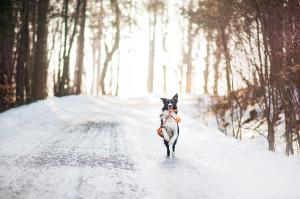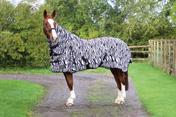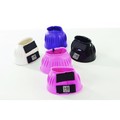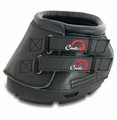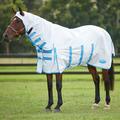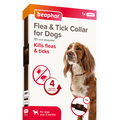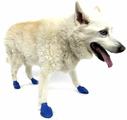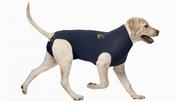As the year draws closer to the colder months, your pet may seem less inclined to go outside. Like humans, our pets feel the cold. But with preparation, you can help them, stay happy, warm, and safe while the environment around them changes. There are plenty of ways to do so. Find some tips below and share any tips you have with us to help other pet owners.
Dogs
-
On chilly days, you may struggle to tempt your dog on a winter walk, but providing a coat to layer up and stay warm can make a big difference when outside.
-
If it has been wet out, rub your dog with a clean towel to remove excess water and moisture, this will help them warm up sooner, particularly with long-haired dogs.
-
Check your dog’s paws and dry them thoroughly after they've been outside. Snow can turn into ice balls which can prove very painful.
-
Cold weather often brings reduced visibility in foggy or snowy weather conditions. If you're letting them off the lead, make sure your dog has good recall to avoid them getting lost, and make sure their microchip details are up to date with your correct contact information.
Cats
-
Cats may prefer to stay indoors, especially at night. Provide plenty of toys and a scratching post to encourage them to move and stay active inside the home.
-
If your cat loves the outdoors, place a shelter in the garden, lined with foil and a blanket so they have a warm, dry place to rest.
-
Antifreeze can be fatal to cats if they ingest it. This is an issue because cats are attracted to its taste. It is sometimes wrongly used in garden ponds and water features to stop them from freezing over, but this poses a risk to cats and so should be avoided. Your cat will have an increase in urination or drinking, vomiting, lethargy, seeming uncoordinated or “drunk”, seizures, unusually fast heart rate, and fast and shallow breathing. If you see any of this immediately speak with your vet.
Horses
-
The cold and wet weather changes mean your horse may require extra care to remain not only physically healthy but mentally stimulated.
-
A horse’s grass intake reduces due to not being readily available. It is important to provide enough forage to help satisfy their behavioral needs. Forage should form the basis of any horse’s diet as they have evolved to chew for up to 18 hours a day.
-
Chewing forage also helps to keep the horse warm, acting as an in-built heating system by creating heat as a byproduct as it breaks down the fibre in the digestive system.
-
Horses aim to keep their temperature around 38°C. When their temperature falls below this during winter some horses may require rugs to help them keep warm. There are several reasons horses would require a rug to help them stay at their ideal temperature.
-
Breeds that have a naturally thinner winter coat such as a Thoroughbred or Arab, as well as Underweight horses. Their reduced weight will prevent them from increasing their metabolic rate and using more energy to keep warm, leading to further weight loss.
-
An old or ill horses typically have more difficulty regulating their body heat.
Small Animals
-
Outdoor caged pets need daily attention morning and evening. Ensure that this is done properly. Remember, small pets can suffer in cold weather or even freeze to death.
-
Rabbits and guinea pigs should be moved to a dry area, like a shed or garage, or even bring them in the house. If they have to stay outdoors, place more blankets over their hutch to prevent them from feeling chilly, and extra bedding to snuggle down for extra comfort.
-
Indoor animals like Hamsters should also be given extra bedding and kept away from drafts to prevent them from going into hibernation. Keeping things dry is essential. Wet bedding will freeze on cold nights, which could lead to your pets becoming ill.
-
Clean the toilet area daily and their whole home regularly, at least once a week. Always replace a small amount of used, un-soiled bedding to maintain familiar scents and reduce stress.
With theses tips your pet, no matter how big or small can stay safe and warm during the winter months. As the years get colder there are a number of products that can help you make sure you dont have to worry. Dog Wear, Scratching post, Rugs and a Hutch are just a few of our products that will make sure your pet stays warm and enjoy winter.
Written by: Lee
